More than 1,000 coal trucks descend on Richards Bay every day and city officials believe transport mafias are sabotaging rail lines and are linked to a string of murders intended to “strike fear into the hearts” of locals.
Deputy Mayor Christo Botha says the murder of a councillor last year was meant to unseat an anti-ANC coalition government trying to bring stability to a city where businesspeople are forced to drive around in heavily armed convoys.
Industry in Richards Bay is massive: huge factories dominate the flatlands leading to the sea, like beast machines in the animated Transformer movies, grunting, groaning and indomitable. Monster power lines crisscross the 12km road running east of the N2 to Africa’s biggest deepwater port.
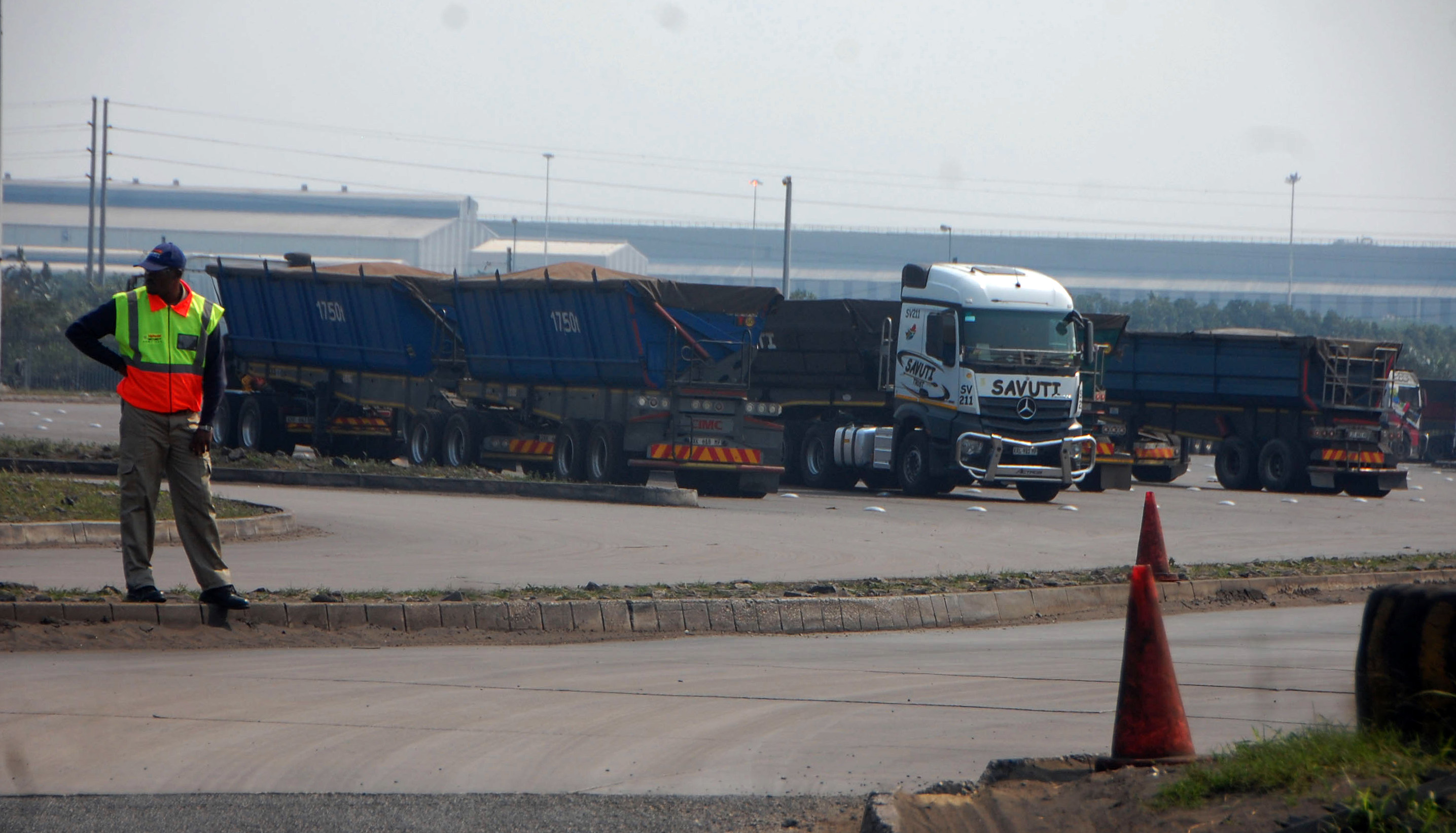 In 2020, about 75,000 heavy-duty trucks drove into Richards Bay. Last year the number was 500,000, says Deputy Mayor Christo Botha. (Photo: Phumlani Thabethe)
In 2020, about 75,000 heavy-duty trucks drove into Richards Bay. Last year the number was 500,000, says Deputy Mayor Christo Botha. (Photo: Phumlani Thabethe)
But the well-documented woes of Transnet have turned the city into a mecca for coal trucks and they have brought with them the kinds of battles that used to be the sole preserve of the minibus taxi industry.
On 12 February, Foskor procurement manager Sifiso Mncube was shot dead while driving home after work. Gunmen pumped 25 AK-47 rounds into his car.
This was no ordinary crime.
His killing was the most recent high-profile corporate murder in Richards Bay. In 2021, Nico Swart, the general manager of Richards Bay Minerals (RBM), was shot dead while driving to work.
His murder and stoppages at RBM that year forced global parent company Rio Tinto to declare force majeure. Swart’s murder was preceded by the killings of community leader Meshack Mbuyazi in 2019 and RBM’s Ronny Nzimande in 2016, although police have linked almost a dozen murders to mafia-related activity in Richards Bay.
In June last year, John Myaka, the sole African Christian Democratic Party (ACDP) councillor in the City of uMhlathuze, the municipality under which Richards Bay falls, was shot dead in front of his congregants.
Unsettling
What’s going on here? The frightened response from the Zululand Chamber of Business to inquiries sums up the mood: “The chamber is not in a position to comment … the atmosphere here is unsettling. I hope you will understand,” a spokesperson said.
A host of businesspeople and private security personnel in Richards Bay spoke anonymously for fear of reprisal.
“These are targeted killings,” said one source. “Nobody is safe. People are careful about what they are saying and who they are saying it to. Safety is key. Sifiso’s killing reopened the Christo wound. Most executives have bulletproof cars and bodyguards.
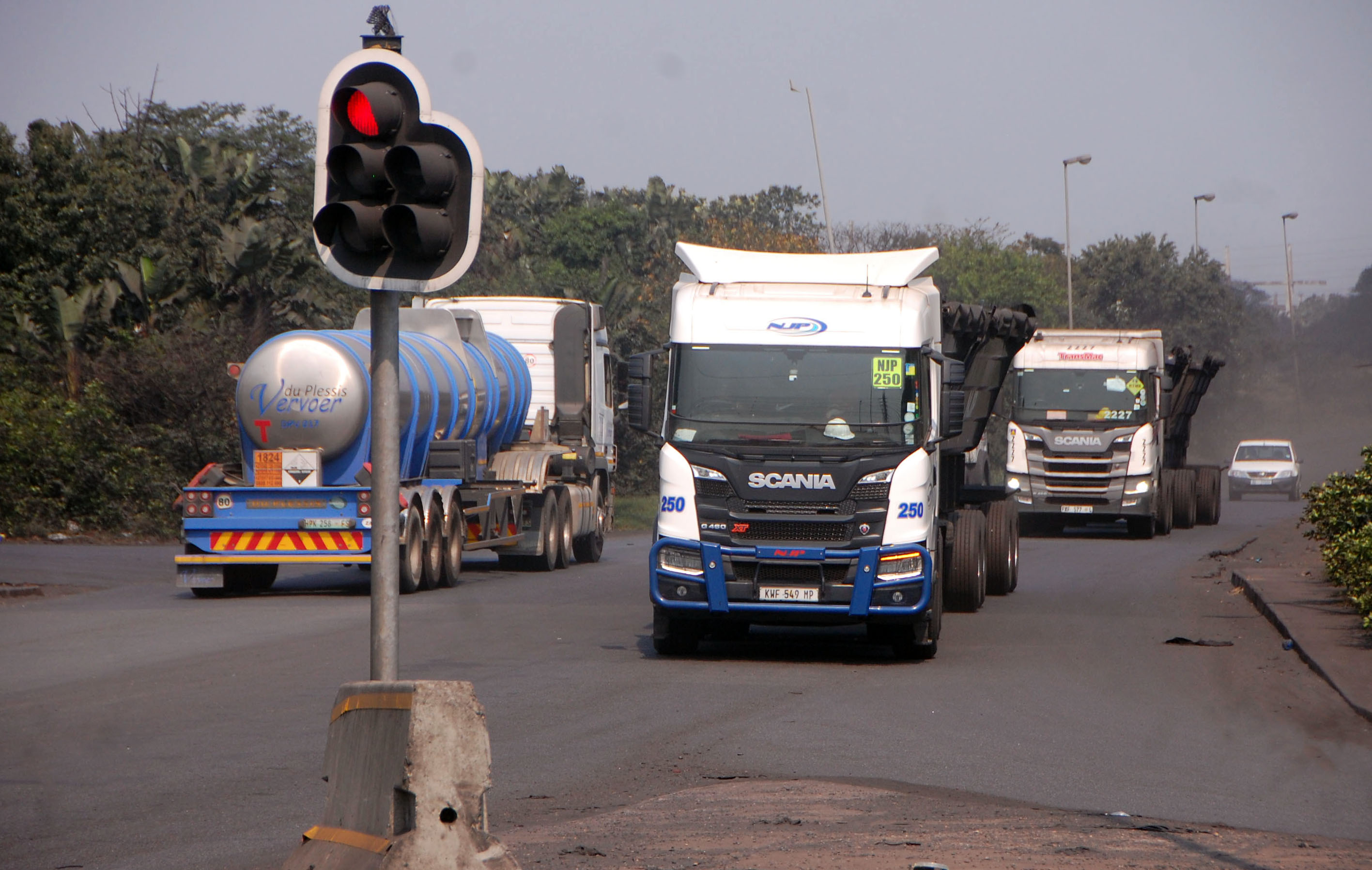 The well-documented woes of Transnet have turned the city into a centre for coal trucks — and they have brought with them the kinds of battles that used to be the sole preserve of the minibus taxi industry.(Photo: Phumlani Thabethe)
The well-documented woes of Transnet have turned the city into a centre for coal trucks — and they have brought with them the kinds of battles that used to be the sole preserve of the minibus taxi industry.(Photo: Phumlani Thabethe)
“This is a scary environment. We are desperate. Organised business has approached the highest office in the land twice, crying out for the President to come here and give guidance.”
Another source said Richards Bay businesses were vigorously trying to resist worker forums demanding to act as labour brokers. “They say we have to recruit staff through them. It is straight extortion. They want to hand out jobs and then they demand a cut of salaries. They are mainly taxi thugs. It’s bad here. You have no idea. We need stability, but people are worried because of shootings and sabotage.”
Cowboys and crooks
In addition to RBM and Foskor, Richards Bay is home to corporate giants such as South32, Mondi, Bell, Tronox Sands, Bidvest and Richards Bay Coal Terminal (RBCT), once the world’s largest coal terminal.
South32 operates aluminium smelters; RBM and Tronox process minerals. Mondi has forests and a wood pulping plant and Bell makes big earthmoving equipment. About 5% of Eskom’s power is consumed in the city, KwaZulu-Natal’s second-biggest economy after eThekwini. Big firms employ thousands.
RBM alone, for example, has more than 5,500 employees and contractors, and is regarded as the biggest corporate taxpayer in KwaZulu-Natal. In 2022, it paid the government R1.4-billion in tax. Bell has 2,593 employees and Tronox more than 700 at its Fairbreeze mine.
The industry in Richards Bay has been a magnet for jobseekers and entrepreneurs. One businessperson said it is “still a frontier town where vast fortunes can be made, but it’s also full of cowboys and crooks”.
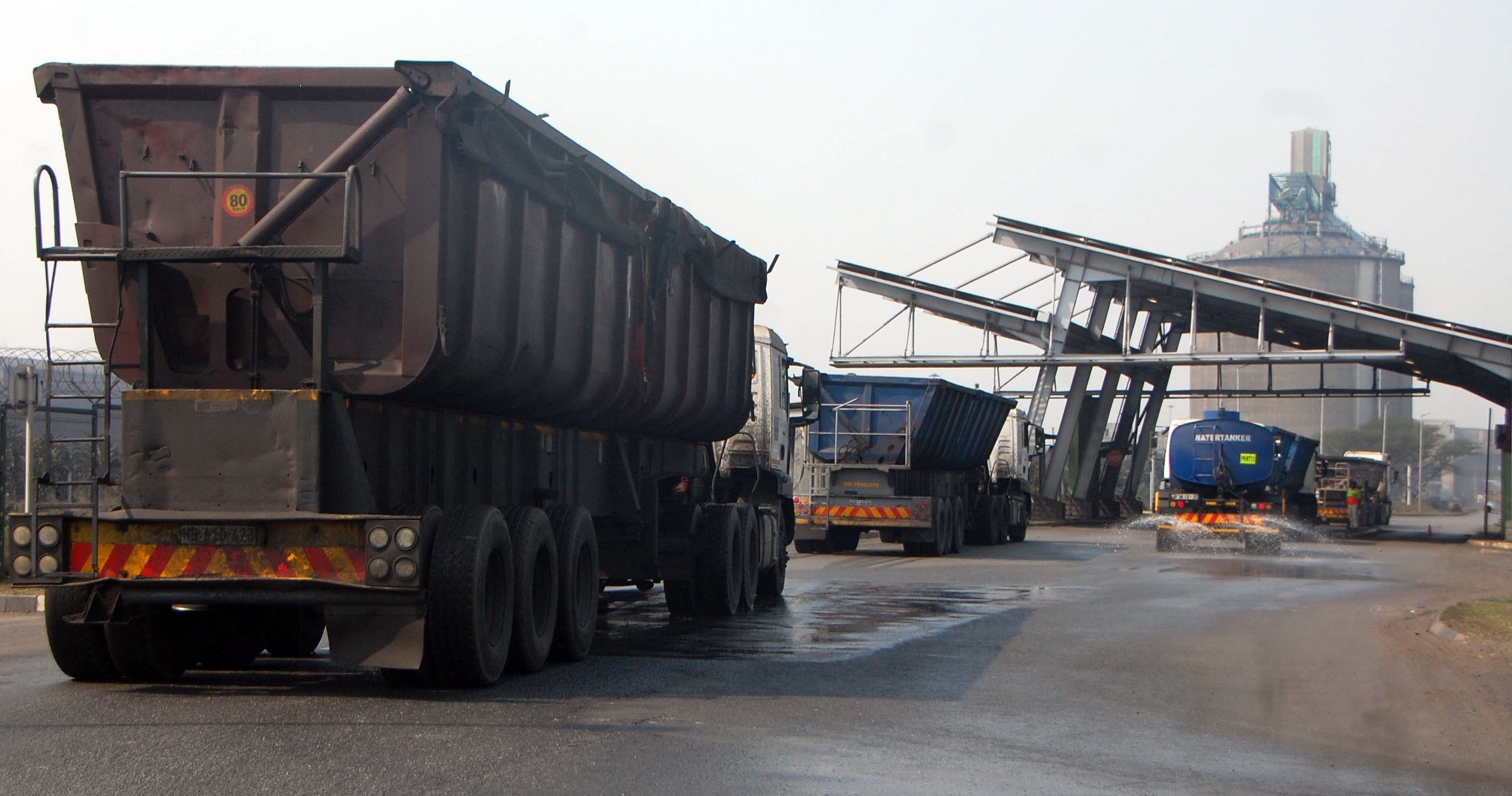 Reuters reported that in 2022 coal miners said they were putting about 400 trucks on the road a day, carrying about six million tonnes of coal a year. (Photo: Phumlani Thabethe)
Reuters reported that in 2022 coal miners said they were putting about 400 trucks on the road a day, carrying about six million tonnes of coal a year. (Photo: Phumlani Thabethe)
Richards Bay industry developed in the mid-1970s after the new deepwater harbour was excavated and a 594km railway line was laid between the city and Mpumalanga to facilitate coal exports.
Botha, a lawyer, has lived in Richards Bay for 23 years, and for almost half that time has been a councillor for the ward that includes Alton, the main business zone.
Coalition success
After the local government elections in 2021, a coalition unseated the ANC, which had been in power for 15 years. The IFP, Botha’s DA, the Freedom Front Plus and the ACDP secured enough seats to take over the municipality and control its R6.5-billion budget.
“We scrutinise the budget, especially tender spending and service delivery,” Botha said.
The size of the budget means the city’s spending is also monitored by the National Treasury, and Botha said that since the ANC was ousted there have been clean audits and no adverse findings by the Auditor-General.
Assassinations in Richards Bay were related to procurement and supply chain issues, he said, echoing a comment made by RBM’s managing director, Werner Duvenhage, at the recent Mining Indaba.
Botha said business felt “very vulnerable”. The murder of the ACDP’s Myaka was an attempt to unseat the coalition and shift the balance of power. It was meant to frighten councillors.
There are 67 councillors. The IFP and the ANC each have 25, so the role of the minority parties is key — the DA has eight, the FF+ one, the ACDP one, the EFF six, and the National Freedom Party one.
Botha said the ACDP councillor who replaced Myaka was not intimidated, but people were understandably fearful. “I have two bodyguards. You can’t hide away or stop AK-47s — you can only pray you aren’t the victim of something nasty. But I speak my mind. If everyone shies away from the issues, we won’t be able to deal with them. We need business confidence and stable government.”
Botha got the bodyguards and the council installed security and face recognition access at the uMhlatuze municipal offices after threats to the deputy mayor and officials who instigated legal action against companies illegally stockpiling coal in Richards Bay.
Coal mafias
Botha said trucking mafias were part of the criminal underworld sabotaging the railway line so that millions of tonnes of coal are diverted from rail to their heavy-duty trucks.
“At least 1,000 trucks are coming into the city a day — sometimes as many as 1,500. The port was never built to accommodate these trucks. It is logjammed. Some days we have a 10km line of trucks backing out of the port. They are demolishing our road network and creating havoc.”
Truckers are making a killing and some operators own as many as 1,000 trucks. “There is no way these guys will stand back and allow their business to be affected. They will keep sabotaging the train lines even if you repair the routes.”
Botha said in 2020 about 75,000 heavy-duty trucks drove into Richards Bay. Last year the number was 500,000. One coal truck carries 34 tonnes and the capacity of a single rail wagon is three times that — more than 90 tonnes. Botha said the rail system was designed for trains pulling 100 wagons.
When demand for coal peaked at $430 a tonne in 2022, truckers coined it.
Transnet did not respond to questions about how much coal has been diverted from rail to road. But Reuters reported that in 2022 coal miners said they were putting about 400 trucks on the road a day, carrying about six million tonnes of coal a year. Transnet said it shipped 58 million tonnes to RBCT, 24% below the annual capacity of 77 million tonnes.
Botha said crime in Richards Bay was diverse and the local police had limited impact. Nobody of significance has been arrested for sabotage to the railway lines, so uMhlatuze is forcing a partial solution by imposing a levy of upwards of R20 a tonne on exports ferried by truck through Richards Bay. There is a council resolution to this effect.
Security
“The mafias have tentacles all over the place and are strangling business,” said a private sector risk expert who advises big companies in Richards Bay. “The state won’t help because it is corrupt. Crime has matured as the economy has grown.”
The expert said mafias were well-resourced and knew the business landscape well. “They have money to register security companies and get powerful weapons. Businesses live in fear of sabotage and hits on their supply chains and the people running them. The security response to threats like this means an overhaul of almost everything you do, which comes at a great cost.”
A Richards Bay entrepreneur said: “In Zululand, businesses are like frogs being slowly boiled alive. People are murdered but business carries on. It’s not unusual to see businesspeople with bodyguards these days. Lots of resources move through Richards Bay and the criminals are hi-tech. We are spending a fortune on protection.”
Another private security operator said: “Companies are resorting to extreme measures. Bigger companies have their principals travelling with close protection officers in B6 heavily armoured vehicles, which can withstand automatic rifle fire. They have backup vehicles and quick-reaction teams. One close protection officer costs R3,000 a day and the armoured car upwards of R850,000.
“The psychological impact of an assassination is enormous. All it takes after a hit is a call to somebody in the supply chain to say: ‘Did you see what happened to so-and-so?’ There is a ripple effect on security costs. You can’t just protect the business leaders. Everyone in the company is afraid. The company has a duty of care to protect them too.”
Solutions
Business in Richards Bay, though seriously spooked, soldiers on. There is too much at stake to back down in the face of mafias.
Botha said: “You can’t sit in the corner and cry; you have to get on with things. Make no mistake, we are under no illusion — the challenges here are huge. But we have a good political partnership and we account properly with clean budgets and a focus on service delivery.
“We have an immense responsibility to make this work. This could be a blueprint for successful coalitions.”
Botha’s can-do attitude seems to have business support. Businesspeople and entrepreneurs who spoke to Daily Maverick credited the municipality with “trying to get things done”.
The deputy mayor said issues related to Transnet and criminal justice were beyond the municipality’s purview, so it had to focus on what it could do.
“We have to change perceptions about this being a war zone,” Botha said. “There is much opportunity here. Industry is huge and we must protect it. We just spent R100-million on water pipes in Alton. There are 17,400 streetlights in the city. When we took over, 1,000 of those weren’t working; now only 120 need to be repaired.
“We have 91 traffic intersections, 45 substations, 700 mini-subs and 8,500 kiosks that provide power directly to the home. There are 2,000km of high-voltage cables underground and 125km of pylons overhead. We have to have a handle on this technical data to manage it properly. If I tried to change a plug at home I would electrocute myself, but up on my office wall is a map of the electrical grid. I have to know how it works. What is inspected is respected.”
On 23 February, President Cyril Ramaphosa was in Durban and met leaders from various business chambers. At least two people at the meeting confirmed that Richards Bay security issues were repeatedly emphasised and the President promised to send resources to help.
“We told the President we cannot continue to do business where people are living in fear of their lives.” DM
Greg Ardé is an author and freelance journalist.
This story first appeared in our weekly Daily Maverick 168 newspaper, which is available countrywide for R29.
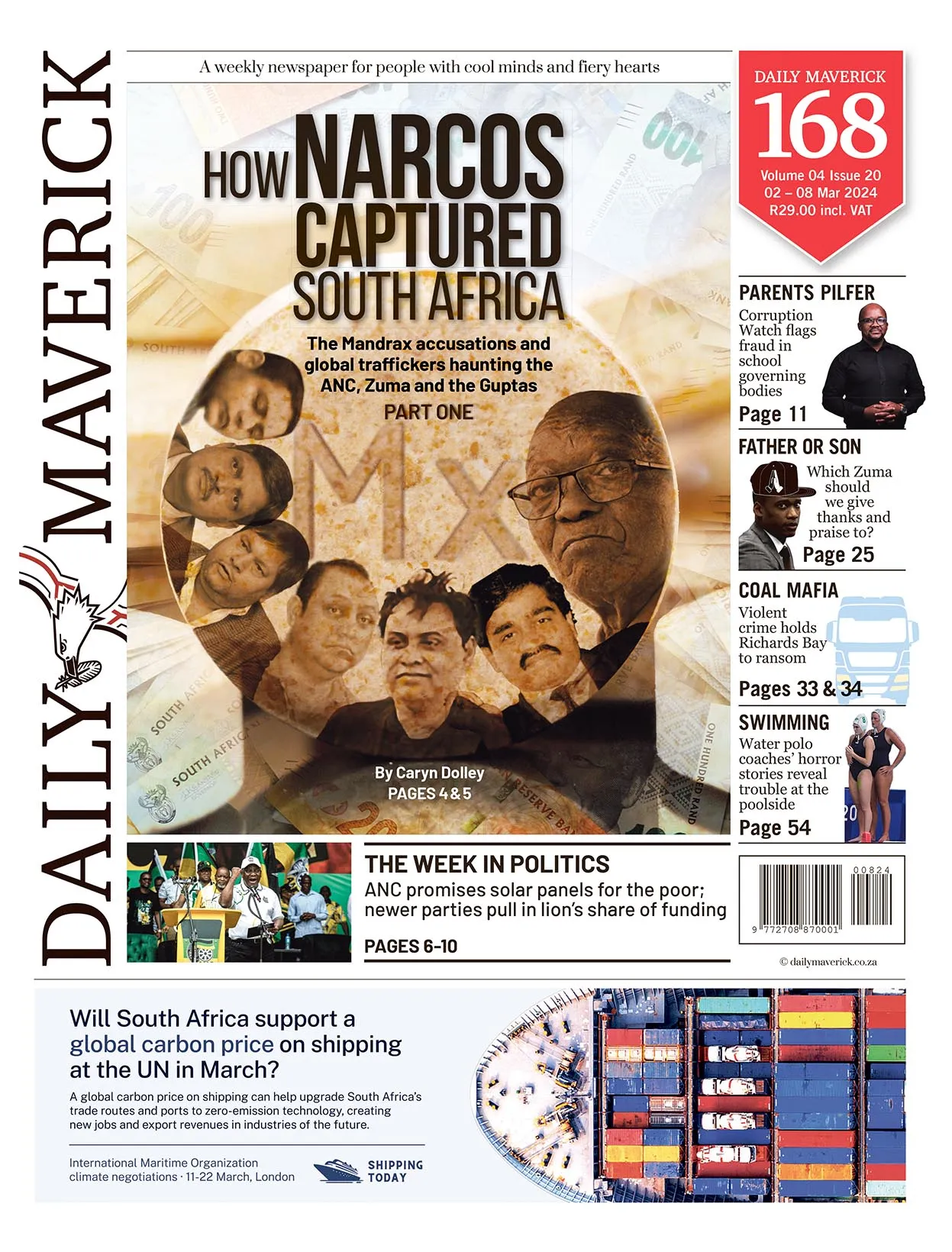




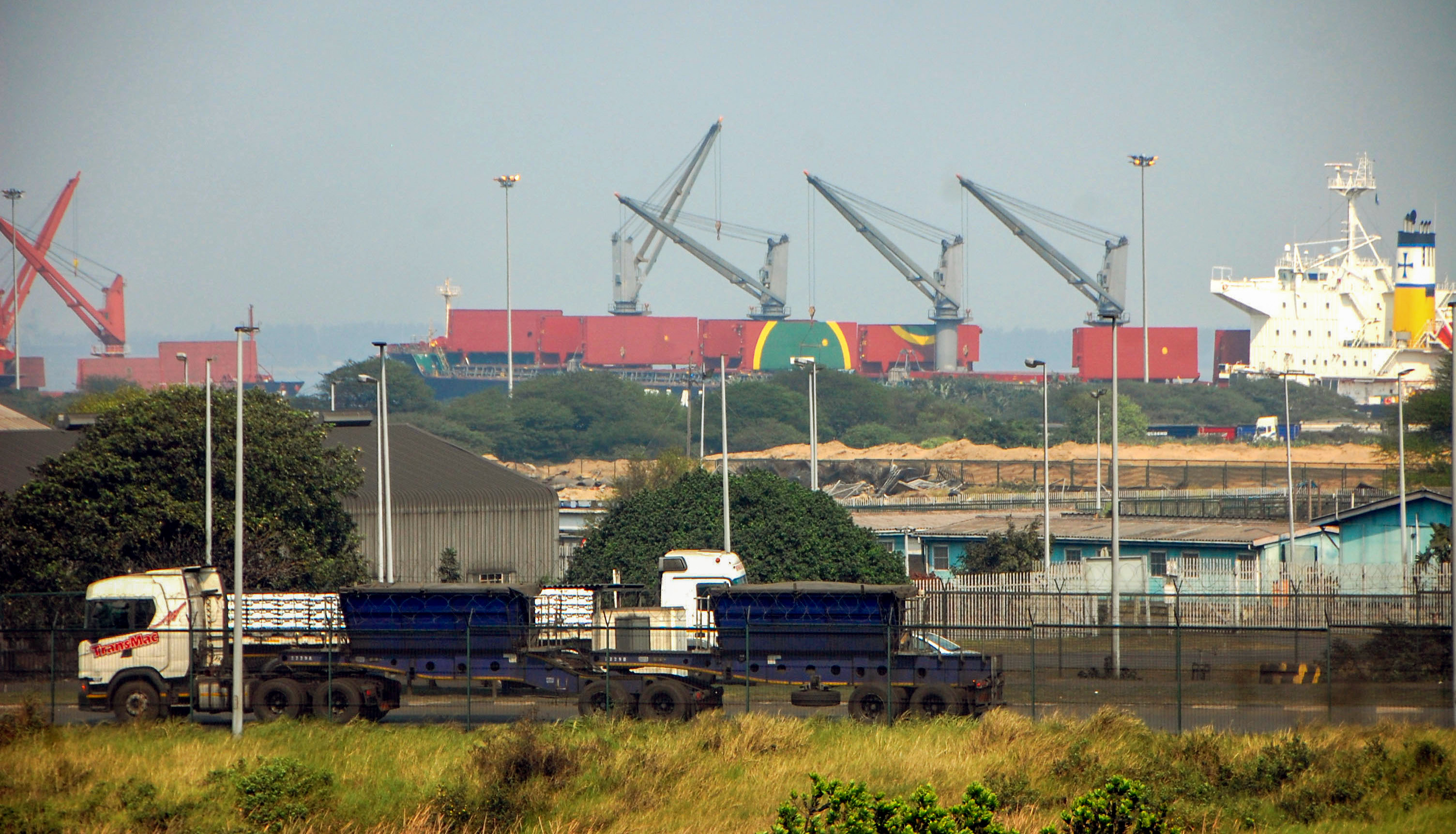 Transnet did not respond to questions about how much coal has been diverted from rail to road. But Reuters reported that in 2022 coal miners said they were putting about 400 trucks on the road a day, carrying about six million tonnes of coal a year. (Photo: Phumlani Thabethe)
Transnet did not respond to questions about how much coal has been diverted from rail to road. But Reuters reported that in 2022 coal miners said they were putting about 400 trucks on the road a day, carrying about six million tonnes of coal a year. (Photo: Phumlani Thabethe)